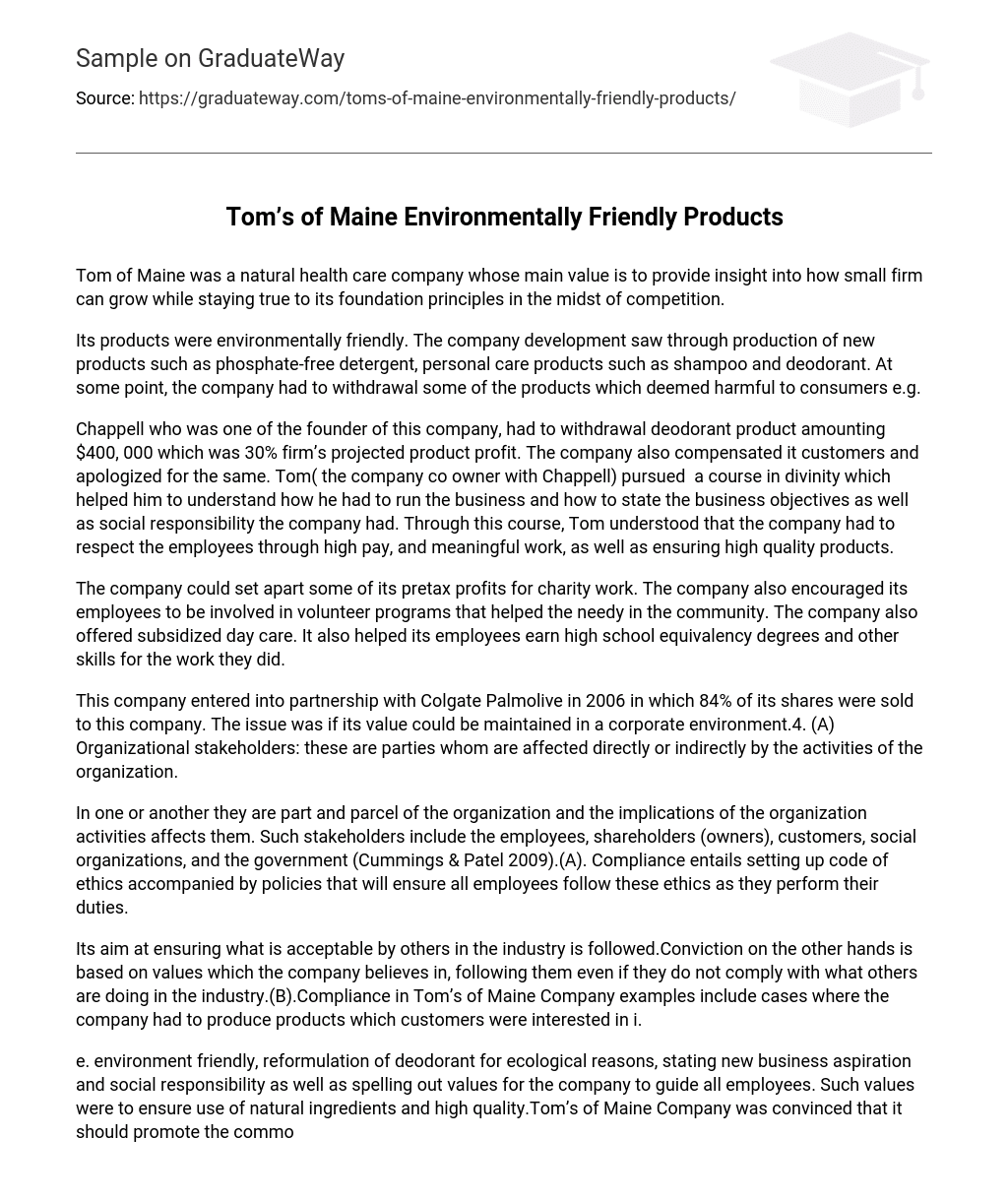Tom of Maine was a natural health care company whose main value is to provide insight into how small firm can grow while staying true to its foundation principles in the midst of competition.
Its products were environmentally friendly. The company development saw through production of new products such as phosphate-free detergent, personal care products such as shampoo and deodorant. At some point, the company had to withdrawal some of the products which deemed harmful to consumers e.g.
Chappell who was one of the founder of this company, had to withdrawal deodorant product amounting $400, 000 which was 30% firm’s projected product profit. The company also compensated it customers and apologized for the same. Tom( the company co owner with Chappell) pursued a course in divinity which helped him to understand how he had to run the business and how to state the business objectives as well as social responsibility the company had. Through this course, Tom understood that the company had to respect the employees through high pay, and meaningful work, as well as ensuring high quality products.
The company could set apart some of its pretax profits for charity work. The company also encouraged its employees to be involved in volunteer programs that helped the needy in the community. The company also offered subsidized day care. It also helped its employees earn high school equivalency degrees and other skills for the work they did.
This company entered into partnership with Colgate Palmolive in 2006 in which 84% of its shares were sold to this company. The issue was if its value could be maintained in a corporate environment.4. (A) Organizational stakeholders: these are parties whom are affected directly or indirectly by the activities of the organization.
In one or another they are part and parcel of the organization and the implications of the organization activities affects them. Such stakeholders include the employees, shareholders (owners), customers, social organizations, and the government (Cummings & Patel 2009).(A). Compliance entails setting up code of ethics accompanied by policies that will ensure all employees follow these ethics as they perform their duties.
Its aim at ensuring what is acceptable by others in the industry is followed.Conviction on the other hands is based on values which the company believes in, following them even if they do not comply with what others are doing in the industry.(B).Compliance in Tom’s of Maine Company examples include cases where the company had to produce products which customers were interested in i.
e. environment friendly, reformulation of deodorant for ecological reasons, stating new business aspiration and social responsibility as well as spelling out values for the company to guide all employees. Such values were to ensure use of natural ingredients and high quality.Tom’s of Maine Company was convinced that it should promote the common good and be passionately concerned about the customers, community, environment and employees.
To ensure this, it produced environmentally friendly products, of high quality, got involved in charity work to help the needy in the society and also ensured good working conditions as well as good pay for the employees(B) Tom’s of Maine endeavored to ensure high quality for its products and withdrew product which had a negative impact on the consumers. The company did not have unfair competition practices as it followed the conviction of promoting common good but not involving in such activities as unfair pricing or copying other products as some company did to its products. The company also had a high value for the community. This included involvement in charitable work and encouraging its employees to involve volunteer programs e.g. teaching art classes to emotionally disturbed children. The company had put aside 10% of its pretax profit for charity community work.
Reference
Cummings, L., & Patel, C.(2009). Managerial Attitudes Toward a Stakeholder ProminenceWithin a Southeast Asia Context. Emerald Group Publishing.





